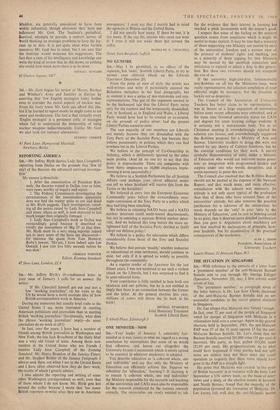ONE MINISTER—NOW
SIR,—Your leader of January 3, admirably fair- minded as it was, comes to what we regard as a wrong conclusion by assumptions that some of us would find offensive, and leaves out altogether the University Grants Commission which is surely agreed to be essential in whatever machinery is adopted.
You describe education as 'a coherent whole, one and indivisible' and say that only the Ministry of Education can efficiently achieve this. Suppose we substitute for 'education,"learning'? if learning is to remain 'a coherent whole, one and indivisible' thp Ministry responsible for the research and teaching of the universities and CATs must also be responsible for the research conducted by the various research councils. The universities are rarely entitled to ask for the evidence that their interest in learning has reached a pitch inconsistent with the nation's good.
I suspect that some of the feeling on the ministry question comes from suspicions which it might be useful to make explicit. It may be true that a minority of those supporting one Ministry are moved by envy of the universities' freedom and a narrow view of the primacy of students' rights and teaching, just as a minority of those arguing for two Ministers may be moved by the snobbish separatism and reluctance to expand or admit a duty to this genera- tion. But these two extremes should not stampede the rest of us.
If the university high-and-drys, fundamentally anti-Robbins on all but the Ministries issue, were really representative, the reluctant conclusion of your editorial might be necessary, but the situation is luckily not so desperate.
The Council of the Association of University Teachers has better claim to be representative. It was in favour of a large expansion of universities before some recent adherents were converted, and at the same time favoured university status for CATs and degrees for some training college students; it is certainly not a restrictionist body, Yet at its Christmas meeting it overwhelmingly rejected the solution you favour, and overwhelmingly supported the Robbins proposal for a Ministry of Arts and Science. University teachers in doing this were not moved by any theory of Cabinet functions, but by the essential conditions for their work. A merely symbolic demonstration of unity under a Minister of Education who would not intervene seems point- less; an integration with programmed ' intakes and outputs under one who would, dangerous, and it seems necessary to point this out.
The Council also resolved that the Robbins Report should not be pushed at the expense of the Newsom Report, and that much more, and more effective, consultation with the schools was necessary. Its attitude is not only more typical of the profession than that of those who have aroused fears of the universities' attitude, but also removes the possible justificaton for a takeover of the universities. So much depends on the 'only' in your 'only by the Ministry of Education,' and its cost to learning could be so great, that it deserves more detailed justification than you gave it. Arguments about machinery are not best resolved by declarations of principle, how- ever laudable, but by examination of the practical consequences of the machinery.
ALAN L. BINNS
President, Association of University Teachers Laurie House, 21 Dawson Place, W2


































 Previous page
Previous page